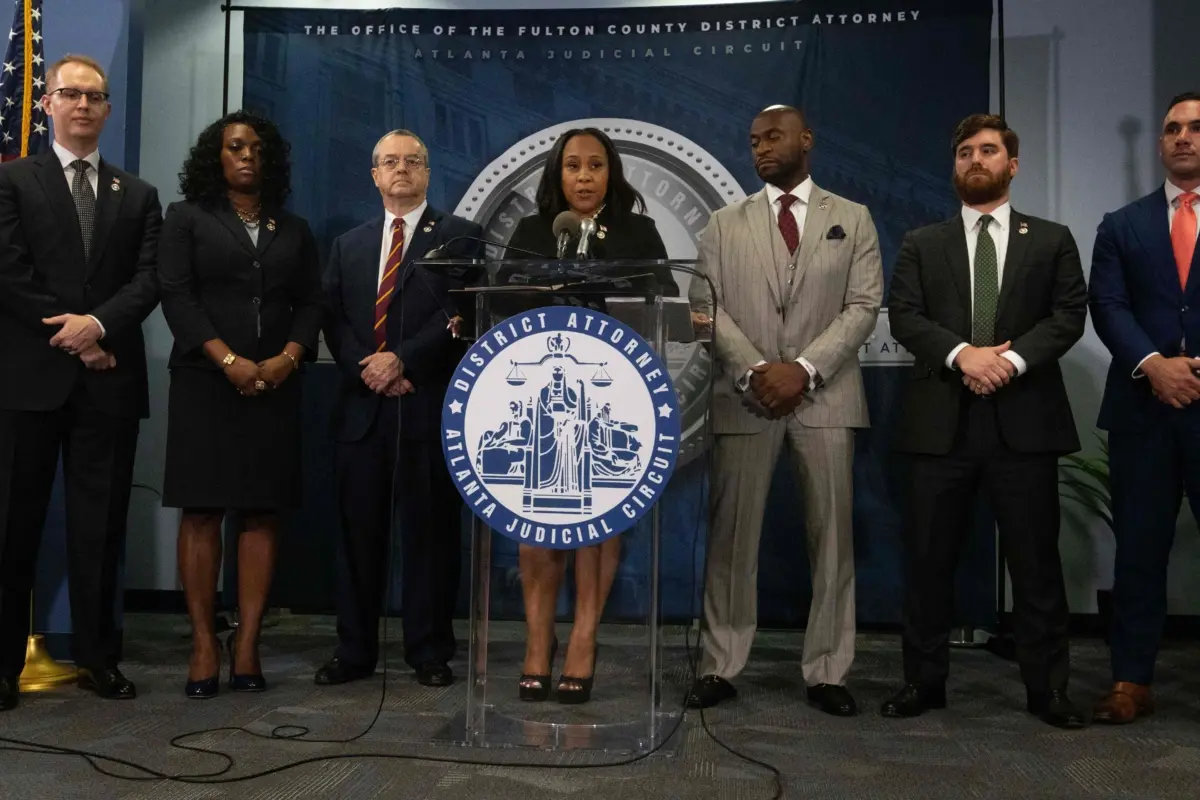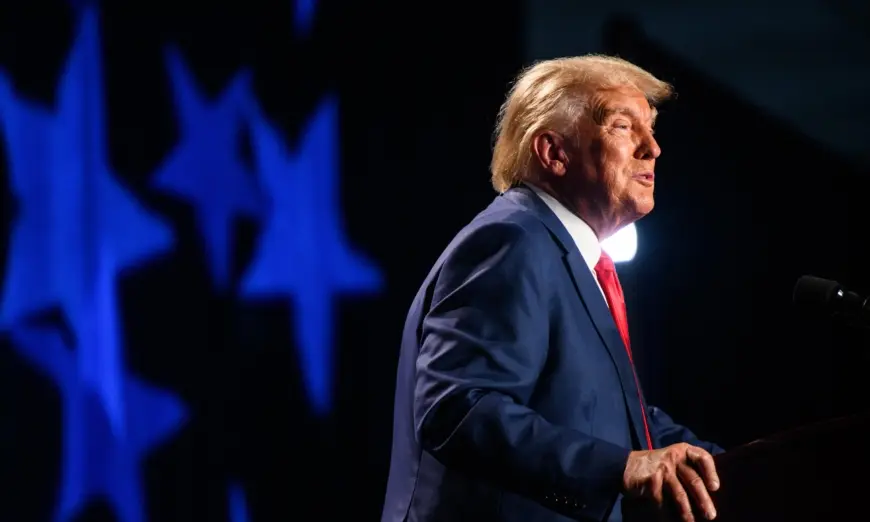Loony DA who ran on "Get Trump" platform charges 19 under law meant for organized crime -- doesn't see the irony.

The district attorney said she intends to try all 19 defendants together. While the grand jury issued arrest warrants for the defendants, Ms. Willis said she is allowing defendants to voluntarily surrender by no later than noon on Friday, Aug. 25
President Trump, in a video published on his campaign website not long after the unsealing of the indictment, said, "Justice and the rule of law are officially dead in America."
"This marks the fourth act of election interference by Crooked Joe Biden and the communist Democrats who are absolutely destroying our country," he added.President
Trump's campaign also released a lengthy statement alleging the latest criminal charges are a politically-motivated attack launched by Ms. Willis.The statement labels her as a "Democrat activist" who supported a Democrat challenger to a Republican whose conduct she was investigating in connection with the 2020 election probe. A judge later ruled that that was a conflict of interest.
Ms. Willis, the campaign said, "bragged to left-wing media outlets about her efforts to take down Trump" and "raised a vast majority of her campaign funds by promoting her election investigation on social media."
The district attorney's investigation was "compromised by unethical conduct and political bias," the campaign added.
Indictment
The indictment alleges that the defendants "joined a conspiracy to unlawfully change the outcome of the election in favor of Trump." According to the indictment, the alleged conspiracy to challenge the 2020 election results extended beyond Georgia into other states, including Arizona, Michigan, and Pennsylvania.
Georgia's prosecutors argue that the post-election challenges amounted to "a criminal organization" that committed crimes including false statements, impersonating a public officer, forgery, computer theft, computer trespass, computer invasion of privacy, conspiracy to defraud the state, perjury, and influencing witnesses.
The indictment alleges that the false statement occurred during three hearings before members of the Georgia General Assembly to "persuade Georgia legislators to reject lawful electoral votes."
The indictment also alleges that the defendants recruited individuals to "cast false Electoral votes at the Georgia State Capitol." According to the indictment, President Trump had sought the Department of Justice (DOJ) to say that the "election was corrupt."
The indictment also alleges that efforts to have Vice President Mike Pence reject Electoral College votes were part of a criminal conspiracy.Just as with an indictment filed earlier this month by Special Counsel Jack Smith, President Trump's post-election challenges were described not as legitimate challenges, but rather as a criminal conspiracy.
When President Trump called on the Speaker of the Georgia House of Representatives to call a special session, the indictment alleges he engaged in the "solicitation of violation of oath by public officer." And when Mr. Meadows traveled to Georgia "to observe the signature match audit being performed" it was an "overt act in furtherance of the conspiracy," according to the indictment, because the "audit process was not open to the public."
Other statements by President Trump to Georgia officials, such as that 250,000 to 300,000 ballots "were dropped mysteriously into the rolls" in the election, that 904 people who voted were registered at one post office box address, and that 5,000 "dead people voted," amounted to "racketeering activity ... and an overt act in furtherance of the conspiracy," according to Georgia prosecutors.

In total, the indictment lists 161 such acts that were allegedly taken to advance the conspiracy.
The indictment also includes multiple unindicted co-conspirators suggesting more charges may follow.
Besides President Trump, Mr. Meadows, Mr. Guiliani, Ms. Ellis, and Ms. Powell, the indictment charged: attorneys John Eastman, Kenneth Chesebro, Ray Smith III, and Robert Cheeley; former DOJ attorney Jeffrey Clark; GOP strategist Michael Roman; Georgia's alternate electors Shawn Still, Cathleen Latham, and David Shafer, former head of the Georgia Republican Party; Illinois pastor Stephen Lee; Harrison Floyd, vice president for the Black Conservative Federation who is also involved in Black Voices for Trump; Trevian Kutti, former publicist for Kanye West; Scott Hall, a Georgia bail bondsman and Fulton County Republican poll watcher; and Misty Hampton, also known as Misty Emily Hayes, former Coffee County elections supervisor.
Document with Charges Earlier Posted
The 13 counts against President Trump correspond precisely with the charges listed in a document that Reuters news service reported earlier in the day. The outlet reported that a document listing those charges was briefly posted on the Georgia court's website on Aug. 14.
However, later in the day, the Fulton County Superior Court clerk's office described what it called "a fictitious document that has been circulated online," without clarifying whether it was the document listing criminal charges against Trump. The Epoch Times sought clarification from the court spokesperson but received no response.
In the weeks and months leading to his four indictments, the former president has railed against the investigations and resulting charges. He has denounced the accusations as an unethical and possibly illegal “election interference” attempt to bolster his Democratic opponent, President Joe Biden, in his bid to retain the presidency.
President Trump contends that President Biden’s Department of Justice (DOJ), and other Democrat foes including Ms. Willis have timed the charges to wound his candidacy in the thick of his campaign—accusations they deny. But despite this, the former president has enjoyed a boost in popularity. He attributes this to a backlash against prosecutions that he has maintained are politically motivated.
The former president and his supporters say Democrats have been allowed to get away with similar or worse conduct under what many on the right have called a “two-tiered system of justice.”
2020 Election
The Georgia charges come more than 2 1/2 years after Ms. Willis launched an investigation of accusations that President Trump and his allies may have criminally interfered with the state’s election results.
President Trump has continually disputed the election results in Georgia and other states ever since the election. Concerns about election integrity have dogged the Peach State in the past, particularly in Fulton County.In December 2020, a month after the election, he had asked Georgia Gov. Brian Kemp to convene a special legislative session to overturn the election results; Gov. Kemp rebuffed that request and also said he lacked the authority to order an audit of absentee ballots, as the president had requested.
Interest in investigating President Trump's dispute over the Georgia election results peaked after reports revealed the contents of a phone call between President Trump and Georgia Secretary of State Brad Raffensperger on Jan. 2, 2021. During the call, President Trump said: "I just want to find 11,780 votes, which is one more that we have because we won the state."
Much debate has swirled around the intent and meaning of President Trump’s statements during that call.Mainstream media outlets often characterize the conversation as one in which the president “demanded” or “pressured” officials to concoct a revised vote tally to benefit him.
Mr. Raffensperger told CBS News that he felt that the president and his team were attempting to intimidate him into taking certain actions.
But President Trump’s spokespersons suggested that Mr. Raffensperger was getting defensive over the president’s criticisms of his work as Georgia’s top elections official.
During the call, President Trump made specific allegations of problems that he believed warranted further investigation, and which would have exceeded the small number of ballots he needed to win the election.
The president said he believed that up to 300,000 ballots "were dropped mysteriously into the rolls," and he thought that fraudulent signatures may have been placed on the ballots.
There also were 4,502 "voters who voted but who weren’t on the voter registration list," plus "18,325 vacant-address voters," the president said. He also alleged that there were 4,925 out-of-staters who voted improperly, along with 2,326 votes tied to absentee ballots that were sent to vacant addresses.
On Jan. 6, 2021, a "Stop the Steal" protest of the election results culminated in the breach of the U.S. Capitol, intensifying criticism of President Trump and his insistence that the election was stolen or "rigged."
Democrats in Congress proceeded to impeach him, attempting to hold him responsible for the violence that broke out. He was acquitted.
Trump's Concerns Regarding Georgia
Later that year, on Sept. 17, 2021, President Trump sent a letter to Mr. Raffensperger, telling him that large-scale voter fraud was still being reported in Georgia. President Trump said he was enclosing a report of 43,000 absentee ballots that were counted in DeKalb County, violating chain-of-custody rules and "making them invalid."
"I would respectfully request that your department check this and, if true, along with many other claims of voter fraud and voter irregularities, start the process of decertifying the election, or whatever the correct legal remedy is, and announce the true winner," President Trump stated.
He maintained that the number of fraudulent or "irregular" votes was "far greater than needed to change the Georgia election result." President Trump said that Mr. Raffensperger and Gov. Kemp left people puzzled because of their alleged refusal "to acknowledge the now-proven facts, and fight so hard that the election truth not be told."
"You and Governor Kemp are doing a tremendous disservice to the Great State of Georgia, and to our Nation–which is systematically being destroyed by an illegitimate president and his administration. The truth must be allowed to come out," President Trump stated
A flurry of court cases and other challenges to the election results in Georgia ensued.
Georgia officials conducted multiple recounts of the ballots, revealing a number of problems. But state leaders insisted that the results showed President Biden was the rightful victor of the election. Supporters of President Trump say the recounts failed to exclude ballots that should have been disqualified for various reasons, including alleged failure to properly track ballots, thus ensuring they were legitimate.
Ms. Willis’s investigation of President Trump and his allies branched into many areas, and speculation has swirled around many other people who might face indictments, too.
Although the grand jury process is supposed to be conducted in secret, reports about the Georgia investigation have named witnesses who were called to testify. Those reports began leaking shortly after a special-purpose grand jury was convened to investigate in January 2022. That grand jury completed its work a year later, in January 2023.This past February, the forewoman of that special-purpose grand jury, Emily Kohrs, gave multiple interviews to news outlets. Some of her remarks and giddy demeanor, as broadcast on TV, sparked controversy. But others say Ms. Kohrs followed a judge’s orders to refrain from providing details about the jury’s deliberations. She also declined to discuss unpublished details of the panel’s report, which officials partly released earlier that month.
In April, Ms. Willis wrote a letter stating that she expected to release the findings of the grand jury between July 11 and Sept. 1. Right on the dot, on July 11, officials in Georgia swore in a new grand jury to decide whether President Trump or his allies would be indicted. Election leaders in multiple other states have been consulted as well, according to reports.
Even as President Trump now faces a pair of indictments over his opposition to the 2020 election results, many other people remain skeptical about the outcome, too. Independent citizens groups are continuing to examine voting records in a number of states, including Georgia. Although some court challenges over Georgia’s 2020 election were thrown out or dropped, others appear to remain unresolved.
(Apparently, the first grand jury refused to charge Trump, so Willis decided on a "do over" to fullfill her promise to "Get Trump." -TPR)